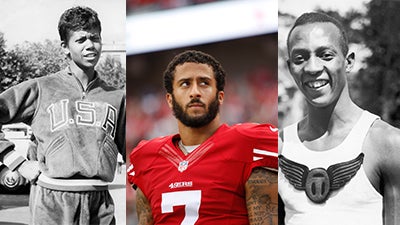
San Francisco 49ers quarterback, Colin Kaepernick, is protesting police brutality and the mistreatment of people of color in America by refusing to stand during the National Anthem before his team’s football games.
“I am not going to stand up to show pride in a flag for a country that oppresses black people and people of color,” he told the press after his most recent “sit down” during a preseason game.
As the news of his bold move spread, Kaepernick has been repeatedly called the “N-word” and has been told to leave the country. He has been insulted by other players in the National Football League and his birth mother, Heidi Russo, even weighed in, tweeting her belief that he “brought shame to his family.” To further complicate matters, at least 10 current and former African-American football players have publicly censured his protest, citing their own robust pride in being American citizens. While they criticize the negative attention they believe Kaepernick brings to his team and the League, the NFL corporation issued its official position that “players are encouraged but not required to stand during the playing of the national anthem.”
If Kaepernick isn’t breaking any laws or violating any official NFL rules, why is he receiving all of the backlash?
This is hardly the first time a Black American athlete has spoken out against racism in America. Decorated football player Jim Brown, tennis legend Arthur Ashe, golfer Tiger Woods, baseball hero Jackie Robinson, boxing legend Muhammad Ali, and more recently, several members of the WNBA are among those who have used their platform to highlight racial injustice in America. NBA star Mahmoud Abdul-Rauf sparked intense debate when, in 1996, he refused to stand for the anthem, citing religious reasons. Abdul-Rauf, who is Muslim, was suspended without pay indefinitely but ended up missing only one day of play. With the support of the NBA Player’s Union, he worked out a compromise in which he would stand, but would focus on praying during the anthem instead.
WANT MORE FROM ESSENCE? Subscribe to our daily newsletter for the latest in hair, beauty, style and celebrity news.
With his simple, but powerful act of defiance, Kaepernick joins a unique athletic club comprised of courageous individuals willing to risk personal and professional injury to draw attention to the poor treatment of Black people in America and demand change. Despite the scores of world records set, hundreds of Olympic medals won, and numerous international athletic victories as representatives of the United States, Black American athletes have not been spared the harsh realities of racial bias.
At the 1936 Olympics, Jesse Owens won four gold medals for the U.S. track and field team. Upon his return from Germany, Owens received no congratulations from President Roosevelt and later stated that he felt he received better treatment in Nazi-occupied Germany than in his own racially-segregated country. While he should have been celebrated for his Olympic achievements and compensated handsomely, particularly special given the world climate, Owens returned to a life of poverty after facing rejection from politicians and entertainers. He resorted to making money by racing against horses and dogs for over a decade until he began securing speaking engagements in the 1950s.
During that same era, Joe Louis became the heavyweight-boxing champion of the world. Carrying pressure to bring home a win in his gloves and the grievances of subjugated Black Americans on his back, Louis became a symbol of American dominance after winning a 1938 rematch against German boxer, Max Schmeling. He went on to serve America in World War II alongside Jackie Robinson in a racially-segregated unit and boxed in almost 100 exhibition matches to keep the troops entertained at the insistence of President Roosevelt. Louis ultimately ran into serious financial troubles, received no support from the White America that exploited his athletic ability for years, and ended up a poor bellhop in Las Vegas before passing away in 1981.
Sprinter Wilma Rudolph won three gold medals as a member of the U.S. track and field team in the 1960 Olympics. A few years later, her hometown planned a grand party to celebrate her success and give her a key to the city. However, on the day of the party, she and 300 invited guests were locked out of the café that was rented for the gathering in an attempt to integrate it in 1963. Rudolph also experienced intense media scrutiny that was both racist and sexist as she experienced hardships related to being both Black and a woman in 1960s America.
Though Black Americans continue to experience the disparate impact of centuries of systemic, institutionalized racism, we are still citizens who have been legally afforded all rights and protections of the constitution. The First Amendment not only legally protects our freedom of speech and religious practice, it also guarantees our freedom to petition for a governmental redress of grievances without fear of reprisal or punishment. Kaepernick’s protest should be seen, then, as a direct complaint and call upon the government to address racial injustice and this petition is explicitly protected by the constitution.







In their disapproval of Kaepernick’s free expression and silent protest, the naysayers have fallen out-of-touch with what it means to be a citizen of their beloved nation; they don’t realize that their venomous criticism is undeniably anti-American and unpatriotic. Kaepernick isn’t wrong in his acknowledgement that people of color in America, especially Black Americans, are continuously subjected to racist oppression and his focus on the current climate in which police officers are not being held accountable for killing unarmed Black citizens is spot on. Kaepernick is also not wrong in protesting what he believes to be an anthem that represents this oppression, especially since the song calls for the killing of Black people.
The only thing wrong in this entire situation is vile hatred coming from too many Americans who not only know very little about the constitution, but who appear determined to deny Black athletes, and Black people in general, the freedom to act on the rights they have as citizens of this nation. Black athletes are American athletes and should be respected and allowed the space to exercise their rights of citizenship. Perhaps Kaepernick’s bravery will inspire more athletes to publicly join the movement to improve the experiences of Black Americans and maybe their collective action will help to bring about the radical change we’ve been fighting for since we were brought to involuntarily build this nation.
Feminista Jones is a social worker and award-winning writer currently residing in Philadelphia, PA. Follow her on Twitter @FeministaJones







